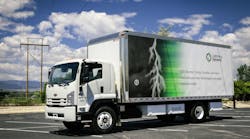Lightning Systems seeing growth as electric grant programs expand
Grant programs in California and other states are playing a critical role in getting more electric commercial vehicles on the road.
For Tim Reeser, CEO and co-founder of Lightning Systems, it also means a need to increase his company’s workforce by 30%. Based in Colorado, Lightning offers electric powertrains for a variety of Classes 3-6 vehicles, as well as larger city buses.
Reeser said programs such as the California Air Resources Board’s Hybrid and Zero Emission Truck and Bus Voucher Incentive Project (HVIP) are making it easier for fleets to begin investing in electric vehicles with less upfront costs. Some of the funding was created out of Volkswagen’s emissions settlement, which required an investment of $800 million for zero emissions projects.
CARB recently said Lightning’s Electric Ford F-59 platform, commonly used in food truck and delivery van applications, qualifies for up to $100,000 in HVIP vouchers in California and similar grants in many other states. The vehicle accommodates a full charge of 80 miles in about 2 hours.
Also during the summer, Lightning announced its electric powertrains for Ford and Chevrolet medium-duty trucks and buses are now offered as part of a new state contract.
California agencies, as well as city and country entities, can order Classes 3-6 shuttle buses, vans, box trucks and other vehicles under a pre-negotiated contract subsidized with a CARB voucher. Lightning said the deal is worth $15-20 million, with 140-160 orders expected.
One vehicle included in that contract is the Ford Transit 350HD cargo van. Lightning recently introduced a longer-range and higher-speed model of its electric system for that vehicle.
The Generation 2 electric powertrain has 20% longer range, with battery configuration options for 60- or 120-mile ranges. The company said it achieves 61 miles per gallon gasoline equivalent, compared with 13 mpg for the gasoline version of the Transit.
In an interview with Fleet Owner, Reeser pointed out Lightning is not the cheapest option for an electric upfit. However, he believes the companies offer the “cost effective” options when factoring in overall cost of ownership over the life of the vehicle.
While some equipment manufacturers focus on a more “one size fits all” electrification approach, Reeser said customers in the commercial space often need customized vehicles. Its why Lightning offers options more tailored to a specific range for customers.
On Sept. 19, the company is holding “Lightning Day 2019,” at its headquarters in Loveland that gives drivers the opportunity to test out a range of their electric vehicles. Reeser said attendees tend to find these events “very compelling” as they discover how different the electric powertrains are than what they have driven in the past.
It lets potential customers more accurately understand the cost differences between electric options and those that need to be refueled with gasoline or diesel each day.
In addition, it leads them to begin thinking about transitioning to refrigerated units or generators on food trucks to electricity, which provides further sustainability benefits, Reeser said.



